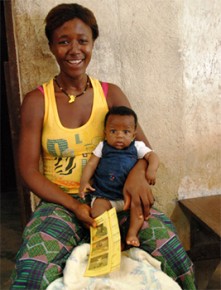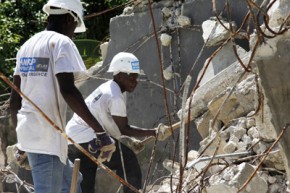
DFID spends over 40% of its annual programme budget through multilateral organisations, including the United Nations, World Bank and European Union - on everything from peacekeeping and responding to humanitarian disasters, to delivering education, immunisation and infrastructure programmes. It is vital that we hold those organisations to account for spending UK aid money well.
That is why last year the DFID Secretary of State asked us to undertake a rigorous assessment of all of the multilateral organisations we fund. Are they focusing on the development objectives that matter to the UK? Are the organisations themselves set up to spend British taxpayers' money effectively?
In March 2011 the UK published its Multilateral Aid Review (which from now on I'll refer to as the MAR). The MAR was cutting-edge and had real impact internationally. No other donor country had published before an explicit comparison of the performance of a wide range of organisations, linking those assessments to funding decisions.
The MAR confirmed that the multilateral system is a critical partner in delivering the UK's development objectives and making a difference for the world's poorest. But we were also tough. We cut funding to multilateral organisations that were performing poorly. Others were placed in 'special measures' and are on notice to make improvements quickly.

DFID continues to assess the performance of our partner multilaterals. We want to see more of the results they are achieving at country level, and to see whether they are improving in areas the MAR assessed as weak.
This blog is to share some of the good work that multilaterals deliver with UK aid, and to show why multilaterals are such important partners in DFID's fight against poverty.
I'll be reporting back on behalf of my team from missions to countries across Africa and Asia. I'll also be talking to DFID staff in our country offices, highlighting examples of good multilateral performance and what we can learn from those examples. I hope that this blog can create the space for a conversation and debate around the opportunities and best practice for working alongside the UK's multilateral partners.

5 comments
Comment by Jiesheng posted on
Thanks. Would also like to contact you or other staff on post MAR issues, especially with regards to IDA
Comment by Angela posted on
Very pleased to read that the UK is holding multilaterals to account -- too often they are given credibility simply for being a multilateral institution, and not for actual results or impact on the ground. Let's make them work as hard for their money as NGOs do! Looking forward to more posts on this topic.
Comment by krajend posted on
It is very good initiative from DFID. The independent evaluation of the programme not only benefit the target people but also the British people by ensuring the right uses of the money that they pay as the tax.
Comment by Jamie posted on
An excellent initiative. As a Brit who's worked in several multilaterals the MAR represents a real step change and a much needed evaluation of how multilateral organisations work and spend their funds. DFID deserves a lot of praise for doing this in an area that doesn't receive much public scrutiny. The fact that so many other bilateral agencies subsequently followed suit and reviewed their funding shows the influence DFID has to make a difference.
I would seriously urge DFID to look into one particular area that was alluded to in the MAR: The expenses regime governing multilateral orgs and their officials - i.e. DSA, per diem. The current system is excessive by any measure and is based on the premise that a lump sum (based on an arbitrarily calculated daily rate) should be paid to an official travelling on mission. Frequently, no expense receipts are even solicited by Secretariats. Consequently, one of the practices that this has given rise to is that the money paid to an official for travel expenses is not fully used and a proportion is kept by officials. Naturally this has a multiplier effect if said official is travelling frequently, thus establishing effectively a second income in extreme cases.
In short, there needs to be a review of the current expenses regime of all funds, programmes and specialised agencies. When governments and bilateral agencies are having to make economies, why shouldn't the multilaterals? In the long term, it would be highly desirable to establish an international standard on expenses governing how multilateral funds are spent, so that widespread abuses don't occur and the funds are spent on development assistance.
I would very much welcome DFID?s comments on what it is doing in this field.
Comment by Kelly posted on
It's great to see appetite for this discussion, and I hope some of my experiences - and from other staff in DFID - will keep your interest.
I just came back from Delhi where I saw some of the great work that WHO and FAO are doing there, alongside the Government of India.
DFID has prioritised a number of reform issues - including HR reform and bearing down on costs.
So watch this space for more (imminently) on both...